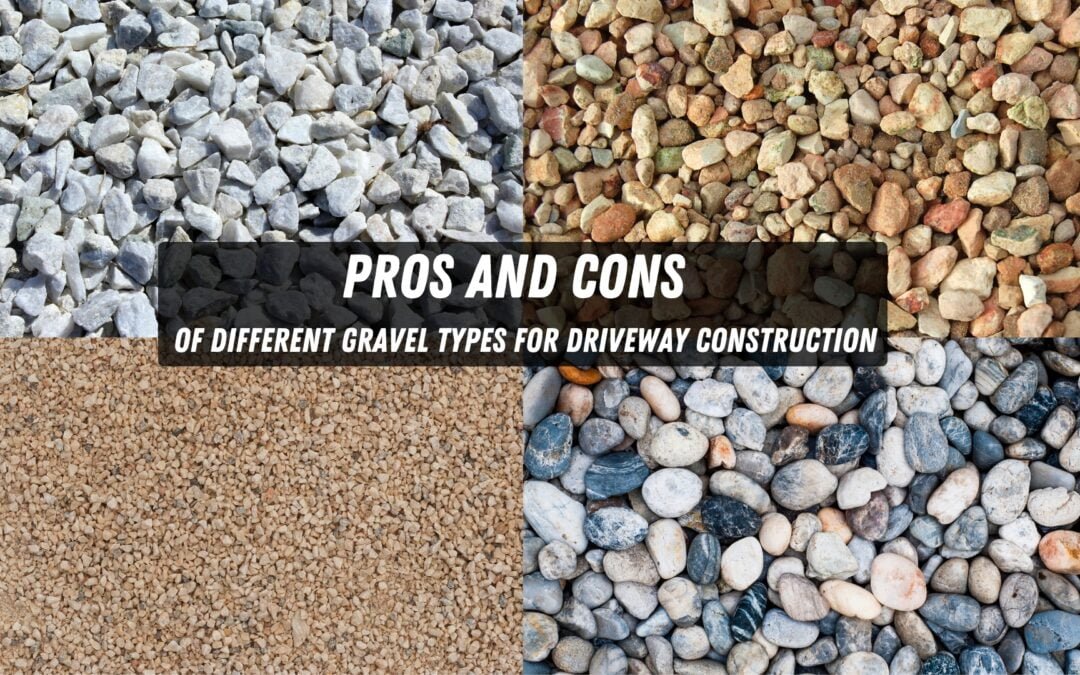When it comes to constructing a gravel driveway, choosing the right type of gravel can make all the difference in terms of aesthetics, durability, and maintenance. With various gravel types available, each with its unique properties, it’s essential to understand their pros and cons to make an informed decision. In this blog, we’ll explore some popular gravel types used for driveways, highlighting their benefits and drawbacks to help you choose the best option for your needs.
1. Crushed Stone
Pros:
- Durability: Crushed stone, often made from limestone or granite, is known for its durability. It can withstand heavy vehicle traffic and is less prone to erosion.
- Stability: The angular shapes of crushed stone help lock the pieces together, creating a stable surface that minimizes shifting and spreading.
- Low Maintenance: Once compacted, crushed stone requires less maintenance compared to some other gravel types.
Cons:
- Sharp Edges: The angular edges can be harsh on bare feet and might cause discomfort if walked on frequently.
- Dust and Debris: Crushed stone can produce dust, especially in dry conditions, which might require occasional replenishing and dust control measures.
2. Pea Gravel
Pros:
- Aesthetic Appeal: Pea gravel consists of small, smooth, rounded stones that provide a clean, polished look. It’s available in a variety of colors, which can enhance the visual appeal of your driveway.
- Comfort: The smooth texture of pea gravel makes it more comfortable to walk on and less likely to cause injury.
Cons:
- Movement: The small, rounded stones tend to shift and move more easily than angular gravels, leading to a less stable surface over time.
- Maintenance: Pea gravel may require more frequent replenishing and spreading due to its tendency to scatter and disperse.
3. River Rock
Pros:
- Aesthetic Variety: River rock is often available in a range of colors and sizes, offering a natural, attractive appearance. It can blend seamlessly with landscaping elements.
- Drainage: The smooth, rounded shape of river rock allows for excellent drainage, reducing water pooling on your driveway.
Cons:
- Stability Issues: Similar to pea gravel, river rock can shift and move over time, leading to an unstable surface. It’s less suitable for areas with heavy traffic.
- Cost: River rock tends to be more expensive than other gravel types due to its natural, smooth appearance and the cost of extraction and transport.
4. Crushed Granite
Pros:
- Color Variety: Crushed granite comes in various colors, from deep reds to grays, allowing you to choose a hue that complements your property.
- Durability: Like crushed stone, crushed granite is durable and withstands heavy traffic well. It also resists erosion and holds up well under various weather conditions.
Cons:
- Sharp Edges: Crushed granite can have sharp edges that may be uncomfortable to walk on and can cause wear and tear on vehicle tires.
- Cost: It can be more expensive than standard crushed stone, depending on the source and color.
5. Decomposed Granite
Pros:
- Compactability: Decomposed granite compacts well, creating a stable, hard surface that is less likely to shift or spread.
- Natural Look: It offers a natural, earthy look that blends well with outdoor landscaping.
Cons:
- Dust: Decomposed granite can produce dust, especially when dry, which may require periodic reapplication and maintenance to keep the surface smooth.
- Erosion: In heavy rain or high-traffic areas, decomposed granite may erode or wash away more quickly than other options.
Conclusion
Choosing the right gravel for your driveway depends on various factors, including your aesthetic preferences, budget, and the level of traffic your driveway will experience. Crushed stone and crushed granite are great options for durability and stability, while pea gravel and river rock offer unique aesthetic qualities but may require more maintenance. Decomposed granite provides a natural look with good compactability but may need occasional upkeep. By understanding the pros and cons of each gravel type, you can make an informed decision that best suits your needs and ensures a functional, attractive driveway.
For guidance and support with your gravel driveway project, reach out to Laborde Land Management. We will assist you in navigating the selection process to guarantee a smooth and successful installation.

